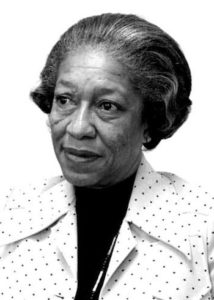
Carolyn R. Payton
*Carolyn Robertson Payton was born on this date in 1925. She was a Black Psychologist, global peace administrator, and advocate.
She was born in Norfolk, Virginia, to Leroy Solomon Robertson and Bertha Flanagan Robertson. Her father was a chef, and her mother was a seamstress and homemaker. She had an older sister, Jean Robertson Scott, who became an elementary school supervisor. Payton and her sister grew up during the Depression, and memories of ramped racism marked her childhood.
She vividly remembered the outdoor toilets for Blacks at her elementary school, the "for whites only" signs, and the many other injustices. Her parents were very supportive of education. Her father chose Bennett College in North Carolina, and a professor influenced her; the first female president of the college, Willa B. Player, was a strong role model for Carolyn during her undergraduate years. Payton was also influenced by Eleanor Roosevelt, whom she met at Bennett College, and many pioneer civil rights leaders such as Mary McLeod Bethune, Nannie Burroughs, Mary Church Terrell, and Charlotte Hawkins Brown.
Payton had majored in home economics at Bennett College and left with only nine credits in psychology. Because of the remaining required courses in psychology, it took her three years to get her master's degree. While at the University of Wisconsin, she was the only Black student in her classes. During this time, she moved to what she called the "Bush," a Black ghetto in Madison. In this community, she found the support she had been missing and soon married a police detective, Raymond Rudolph Payton, who was only married for four years. In 1948, she received her M.S. degree in clinical psychology. She applied and was hired at Livingstone College in Salisbury, North Carolina. She continued working at Livingstone for the next five years until she learned of a position as Dean of Women and psychology instructor at Elizabeth City State Teachers College in North Carolina.
The challenge of the administrative responsibilities appealed to her greatly and she accepted the position. As Dean of Women, she was considered a role model for female students and was to serve as a substitute parental figure for them. Three years later, she was recruited to become an associate professor of psychology at Virginia State College. The position attracted her; it enabled her to be closer to her family. In this position, she conducted psychological testing and provided psychotherapy to students. In 1952, she began taking summer courses at Columbia University's teacher's college. In 1958 she applied as a doctoral candidate. She took a leave of absence from Virginia State College to pursue this degree and received her Ed.D. in 1962.
In 1959, Payton became an assistant professor at Howard University in Washington, D.C. Here she worked in a primate laboratory, that led to her award of a three-year grant from the National Institute of Mental Health. Her work focused mostly on perception, with the ultimate goal of building on the research and studying racial perception in young children. Around this time, however, President Kennedy was establishing the Peace Corps, and Payton was recommended by her university to assist in designing selection procedures for Peace Corps service.
She later became a field assessment officer for trainees preparing to serve in West Africa. She employed psychological tests, interviews, clinical observations, peer reviews and other data to assess trainees' physical, mental, and technical qualifications for service. Over the next few years, Payton became increasingly involved in the Peace Corps, eventually living on campsites and traveling extensively overseas. She became particularly interested in determining the conditions leading to the most satisfying volunteer experience. She was appointed deputy director for the Caribbean region in 1966 and, the next year, director of the post. At the time, Payton was one of few women appointed to such positions; she was one of only two female country directors.
In 1970, she returned to Howard University to direct the University Counseling Service (UCS). Payton expanded the small agency into a large, multi-service counseling and training center that was very involved in the university and community. She redefined the agency's mission by demonstrating that academic advising was insufficient and that staff and students could benefit from psychological services. She was a powerful advocate for women's and minority rights, a pioneer in cross-cultural and ethnic minority psychology, and the early movement for specialized training for psychotherapists for treating clients of an ethnic minority. Not only was she the first woman and the first Black psychologist to hold the position of director of the U.S. Peace Corps, but also she was the agency's first individual psychologist. Carolyn Robertson Payton died on April 11th 2001.
